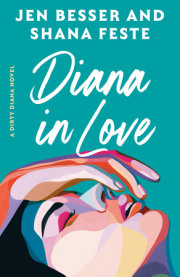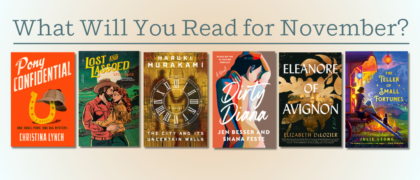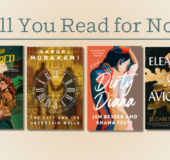Chapter 1 There’s a room in our house that we rarely set foot in. It’s the third of three bedrooms, small and perfectly square, the room no one sleeps in. It’s also the only room that still has carpet—thick, creamy white pile laid down by the previous owners.
Oliver and I have come here searching for wrapping paper, just enough to wrap the small plastic mermaid he and our daughter, Emmy, bought for her best friend’s birthday. “They would have wrapped it for you at the store,” I say. I can’t help it. “For free.”
He glances toward the overstuffed closet. “We had to hightail it out of there, before Emmy swiped anything.”
“Oliver.” I laugh. “That was one time. Almost a year ago.” When she was five, our daughter stole a pack of Juicy Fruit from the grocery store checkout line, then feigned innocence in the car while trying to blow a bubble.
“She’s a thief, Diana. A stone-cold klepto.” Oliver smiles and backs out of the room, leaving me to hunt for the paper.
In the beginning, Oliver and I dreamed this room could be a work space for us both. It’s too tight for him to set up a proper workshop, but it gets great afternoon light and could fit the kind of drafting table he’s always wanted. And I’d have room for an easel and paints.
When we first met, I was twenty-six and living in Dallas with seven roommates in a run-down house we all tried to pretend was an artist commune. We called it “The Co-op” but it was more like a party house that no one ever cleaned. I once determinedly taped up a chore chart with a sign-up column, thinking this would fix things. Instead of marking down their own initials, my roommates penciled in Matthew McConaughey for toilets and The Ghost of Sir Alec Guinness for kitchen duty.
In the hottest part of summer, someone left raw meat in the broken garbage disposal and we got maggots, so I started stashing my food in my room. Some afternoons, I amused myself by sketching the house and my roommates, embellished and a little grotesque. I sent a handful of the drawings to my friend Barry, back in Santa Fe, and others to my best friend, Alicia, away at film school in New York. I signed them “Dirty Diana” because exaggerated stories of my filthy Coop adventures horrified Barry and made Alicia laugh. They both sent back long, sweet letters, and once Alicia just sent a note that read, “Blink twice if I should send help,” glued to a clean kitchen sponge.
Then one night I got food poisoning, probably from the family meal at my waitressing job, and had to hole up in the Coop’s downstairs bathroom. My housemates were having a party, and while I lay on the cold tiled floor, my long, dark-blond hair matted to my sweaty face, I prayed for the vomiting to end as partygoers stepped over me to use the toilet. Curled up near the bathtub, I noticed its edges had been graffitied in Sharpie. Someone had drawn a pretty good Bart Simpson on a skateboard, and someone else had composed a limerick: Now I sit, my buns a-flexin’ / I just gave birth to something the size of a Texan. My head was split open with a headache and in that moment I thought, Nice rhyme. But the meter is off. The next day I started looking for a new place to live.
I saw five studio apartments, all with leaks and strange smells, and then I walked up to the last place on my list, in a squat gray stucco building on a quiet street, with a cheerful row of pink rosebushes along the entrance.
A guy sat out front, calmly slapping at mosquitoes. “Ms. Reece?” He folded the paper he’d been reading into a perfect square and stood, tucking it into his pants pocket. He was dressed like someone much older, in pleated khakis and a mint-colored button-down shirt, so it was only when I got near him that I realized we must be close in age. He had thick brown hair, broad shoulders, and blue-green eyes that look the way I imagined a midwestern lake does at the peak of summer—no choppy waves, just warm, glistening water.
I apologized for keeping him waiting. “I got the wrong bus. Twice, actually. I got off the wrong bus to catch the right one and got back on the wrong one.” I searched his expression, those kind eyes, and imagined how I’d sketch him: perfectly straight nose down, looking up at me from under furrowed brows, a thought bubble over his head: Jesus, who sent this one?
But in real life, there was no judgment on his face, not even a ripple in his calm eyes. I pushed my bangs from my forehead, wishing I’d washed my hair instead of twisting it into the messy bun at my neck. “And then the AC on the third bus wasn’t working, so even though I was on the right bus, it definitely felt like—” There it was, a small but perceptive crinkle between his brows. “It was the right bus,” I wrapped up. “But it felt like the wrong bus.”
He paused, as if to let me catch my breath. “I’m Oliver Wood. You’re here to see 4B?”
“That’s right. I’m Diana.”
We shook hands and I followed him to the elevator. The space was so tight that standing side by side my shoulder grazed his biceps and I could smell his aftershave, light and clean. When the doors shut, he leaned forward and pushed the fourth-floor button three times. Nothing happened. We waited in silence and he tried again. Still nothing. This seemed to fluster him, so I jumped up and down and the elevator jerked awake.
“Thanks.” He cleared his throat. “Have you lived in Dallas long?”
“Not really, no. About a year.”
“Are you in school?”
“No. I paint.” The elevator was hot and silent so I added, “I just published a book.”
“Really?” His eyebrows rose, like he was genuinely happy for me. “I’ll have to buy a copy.”
“It’s kind of hard to find. It was published by a tiny local press.”
“Oh.” His disappointment surprised me.
“I could send you a copy?”
The book was the whole reason I’d landed in Texas, after an editor had been so encouraging of my work and even found me a room at the Co-op. I pictured what might happen if I did pull out a copy in the tiny elevator, and together this polite stranger and I leafed through my paintings, some of them of women in various states of sexual longing, framed by interviews I’d compiled about their desires.
“My aunt paints,” Oliver piped in.
“Oh yeah?”
“Mostly portraits. Of her dog.” He lowered his voice as if she were near. “They’re a little frightening. But come to think of it, her dogs are pretty frightening so maybe she’s more talented than I think?”
“Maybe.” I smiled and felt his shoulders relax beside me.
Oliver showed me to the apartment door, then pulled a gigantic ring of keys from his satchel and tried one after another, the tips of his ears going pink. Finally there was a click and he sighed. “High security, right? Even the tenant can’t get into their own apartment.”
The apartment wasn’t much: a square room with two small windows, one overlooking the parking lot and the other overlooking the roses. A small kitchenette with a half-size refrigerator, an electric oven, and a sink. Oliver consulted his sheet of paper and said, “All new appliances!” And then he opened the refrigerator and found a half-empty bottle of ketchup, a jar of mayonnaise, and a Coors Light. “And look at the amenities!”
When I laughed, he looked relieved. “I’d give you more of a tour but you really just have to spin around,” he said. “Not that that’s a bad thing. Less to clean?”
I remembered the Co-op’s Sharpie poetry and sticky bathroom floor. “I like it.”
“Water and trash are included. Do you like baths?”
“I do.”
“Good. I like baths, too.” He swung open a door just opposite us, and then paled when he saw the size of the bathroom, which barely fit a toilet much less a tub. “I really am horrible at this.”
“It’s actually the nicest apartment I’ve seen today.”
“Yeah, but you deserve a bath.” The intimacy of this took us both off guard and Oliver blushed.
“The kitchen is definitely the best I’ve seen today.”
“Do you cook?”
“Not at all.” Then, because I got the impression neither of us wanted the house tour to end, I opened the fridge and reached for the Coors Light. “I do appreciate the amenities.”
He smiled again and took the bottle from my hands, opening it with one of the many keys on his ring. The beer was cold and delicious and I handed it back, offering to share. “I’d get you a glass, but . . .” I gestured around the empty kitchen. “We could sit on my imaginary couch?”
Copyright © 2024 by Jen Besser. All rights reserved. No part of this excerpt may be reproduced or reprinted without permission in writing from the publisher.








